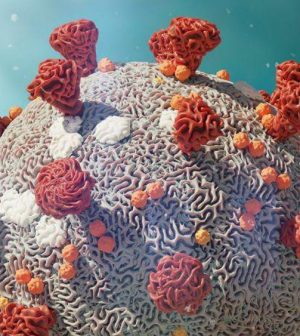- Could Your Grocery Store Meat Be Causing Recurring UTIs?
- Are You Making This Expensive Thermostat Error This Winter?
- Recognizing the Signs of Hypothyroidism
- 10 Strategies to Overcome Insomnia
- Could Artificial Sweeteners Be Aging the Brain Faster?
- Techniques for Soothing Your Nervous System
- Does the Water in Your House Smell Funny? Here’s Why
- Can a Daily Dose of Apple Cider Vinegar Actually Aid Weight Loss?
- 6 Health Beverages That Can Actually Spike Your Blood Sugar
- Treatment Options for Social Anxiety Disorder
COVID Likely Paralyzed a Teen’s Vocal Cords, Doctors Say

COVID-19 appears to have paralyzed a teen girl’s vocal cords, blocking her breathing to the point that surgery was required, a new case report says.
The case suggests that vocal cord paralysis might be a rare complication of COVID infection, caused by the virus’ effect on the nervous system.
“Given how common this virus is among children, this newly recognized potential complication should be considered in any child presenting with a breathing, talking or swallowing complaint after a recent COVID-19 diagnosis,” lead researcher Dr. Danielle Larrow, a resident at Massachusetts Eye and Ear Infirmary in Boston, said in a news release.
“This is especially important as such complaints could be easily attributed to more common diagnoses such as asthma,” she said.
While there have been several reports of vocal cord paralysis in adults, this is the first report of the complication in a teenager, researchers said. The case report was published Dec. 19 in the journal Pediatrics.
The otherwise healthy 15-year-old girl arrived at the ER at Massachusetts General Hospital with difficulty breathing, nine days after she’d been diagnosed with COVID.
Doctors snaked a flexible tube down her throat and found that both vocal cords in her voice box had been paralyzed. They concluded the paralysis likely was a downstream effect of her infection, as an extensive workup revealed no other cause.
COVID has been known to affect the nervous system in other ways, researchers noted. These include headache, dizziness, brain fog, and altered taste and smell.
Doctors first tried speech therapy to relieve the girl’s respiratory symptoms. When that didn’t work, they used surgery to create an opening in her windpipe that relieved her breathing problems, a procedure called a tracheostomy.
The girl depended on her tracheostomy for more than 13 months to help her breathe – an indication that this type of nerve symptom from COVID might not be temporary, doctors said.
Doctors removed her tracheostomy 15 months after it was inserted, just in time for the girl’s high school prom and graduation.
“She was having her senior prom a year and a quarter to the date of when she lost her function, and she told me she was not going to go to the prom with her tracheostomy in place,” senior author Dr. Christopher Hartnick, director of the Mass Eye and Ear’s Division of Pediatric Otolaryngology and Pediatric Airway, Voice, and Swallowing Center, said in a news release.
“We decided to intervene so that she could graduate high school and go to her prom tracheostomy-free, which she did,” Hartnick said.
These types of complications are not usually expected in young, healthy kids and teens. There have been more than 15 million reported cases of pediatric COVID infection, researchers noted.
“The fact that kids can actually have long term neurotrophic effects from COVID-19 is something that it’s important for the broader pediatric community to be aware of in order to be able to treat our kids well,” Hartnick said.
More information
The National Institutes of Health have more about COVID and the nervous system.
SOURCE: Massachusetts Eye and Ear Infirmary, news release, Dec. 19, 2023
Source: HealthDay
Copyright © 2026 HealthDay. All rights reserved.










